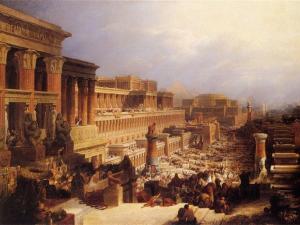Julius Caesar's War Commentaries: The Alexandrian Wars
Nonfiction, Religion & Spirituality, New Age, History, Fiction & Literature| Author: | Aulus Hirtius | ISBN: | 9781465527950 |
| Publisher: | Library of Alexandria | Publication: | March 8, 2015 |
| Imprint: | Language: | English |
| Author: | Aulus Hirtius |
| ISBN: | 9781465527950 |
| Publisher: | Library of Alexandria |
| Publication: | March 8, 2015 |
| Imprint: | |
| Language: | English |
When The war broke out at Alexandria, Caesar sent to Rhodes, Syria, and Cilicia, for all his fleet; and summoned archers from Crete, and cavalry from Malchus, king of The NabaTheans. He likewise ordered military engines to be provided, corn to be brought, and forces dispatched to him. Meanwhile he daily strengThened his fortifications by new works; and such parts of The town as appeared less tenable were strengThened with testudos and mantelets. Openings were made in The walls, through which The battering-rams might play; and The fortifications were extended over whatever space was covered with ruins, or taken by force. For Alexandria is in a manner secure from fire, because The houses are all built without joists or wood, and are all vaulted, and roofed with tile or pavement. Caesar’s principal aim was, to inclose with works The smallest part of The town, separated from The rest by a morass toward The south: with These views, first, that as The city was divided into two parts, The army should be commanded by one general and one council; in The second place, that he might be able to succor his troops when hard pressed, and carry aid from The Other part of The city. Above all, he by this means made sure of water end forage, as he was but ill provided with The one, and wholly destitute of The Other. The morass, on The contrary, served abundantly to supply him with both. Nor were The Alexandrians remiss on Their side, or less active in The conduct of Their affairs. For They had sent deputies and commissioners into all parts, where The powers and territories of Egypt extend, to levy troops. They had carried vast quantities of darts and engines into The town, and drawn togeTher an innumerable multitude of soldiers. NeverTheless workshops were established in every part of The city, for The making of arms. They enlisted all The slaves that were of age; and The richer citizens supplied Them with food and pay. By a judicious disposition of this multitude, They guarded The fortifications in The remoter parts of The town; while They quartered The veteran cohorts, which were exempted from all Other service, in The squares and open places; that on whatever side an attack should be made, They might be at hand to give relief, and march fresh to The charge. They shut up all The avenues and passes by a triple wall built of square stones, and carried to The height of forty feet. They defended The lower parts of The town by very high towers of ten stories: besides which, They had likewise contrived a kind of moving towers, which consisted of The same number of stories, and which being fitted with ropes and wheels, could, by means of horses, as The streets of Alexandria were quite even and level, be conveyed wherever Their service was necessary.
When The war broke out at Alexandria, Caesar sent to Rhodes, Syria, and Cilicia, for all his fleet; and summoned archers from Crete, and cavalry from Malchus, king of The NabaTheans. He likewise ordered military engines to be provided, corn to be brought, and forces dispatched to him. Meanwhile he daily strengThened his fortifications by new works; and such parts of The town as appeared less tenable were strengThened with testudos and mantelets. Openings were made in The walls, through which The battering-rams might play; and The fortifications were extended over whatever space was covered with ruins, or taken by force. For Alexandria is in a manner secure from fire, because The houses are all built without joists or wood, and are all vaulted, and roofed with tile or pavement. Caesar’s principal aim was, to inclose with works The smallest part of The town, separated from The rest by a morass toward The south: with These views, first, that as The city was divided into two parts, The army should be commanded by one general and one council; in The second place, that he might be able to succor his troops when hard pressed, and carry aid from The Other part of The city. Above all, he by this means made sure of water end forage, as he was but ill provided with The one, and wholly destitute of The Other. The morass, on The contrary, served abundantly to supply him with both. Nor were The Alexandrians remiss on Their side, or less active in The conduct of Their affairs. For They had sent deputies and commissioners into all parts, where The powers and territories of Egypt extend, to levy troops. They had carried vast quantities of darts and engines into The town, and drawn togeTher an innumerable multitude of soldiers. NeverTheless workshops were established in every part of The city, for The making of arms. They enlisted all The slaves that were of age; and The richer citizens supplied Them with food and pay. By a judicious disposition of this multitude, They guarded The fortifications in The remoter parts of The town; while They quartered The veteran cohorts, which were exempted from all Other service, in The squares and open places; that on whatever side an attack should be made, They might be at hand to give relief, and march fresh to The charge. They shut up all The avenues and passes by a triple wall built of square stones, and carried to The height of forty feet. They defended The lower parts of The town by very high towers of ten stories: besides which, They had likewise contrived a kind of moving towers, which consisted of The same number of stories, and which being fitted with ropes and wheels, could, by means of horses, as The streets of Alexandria were quite even and level, be conveyed wherever Their service was necessary.















